Can Montenegro shake off crime hub image?
- Published
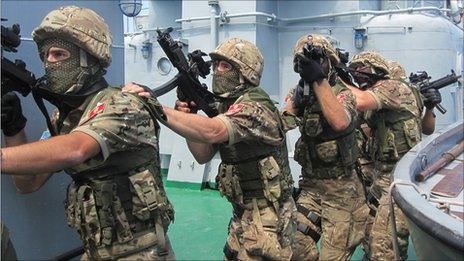
Montenegrin troops are preparing to combat terrorism abroad, but will their government tackle crime at home?
Marine commandos speed across the Adriatic Sea in a raiding craft towards an old Soviet-era warship. They are on a training exercise to combat terrorism and organised crime.
Tiny Montenegro, with a population of just over half a million, is keenly preparing itself for membership of the EU and Nato.
Its troops are already in Afghanistan and will soon be sent to tackle piracy off the coast of Somalia.
"Montenegro has managed its independence to the highest European standards," says Prime Minister Milo Djukanovic. "Our main challenge now is the rule of law and fighting corruption and crime."
And there lies the twist.
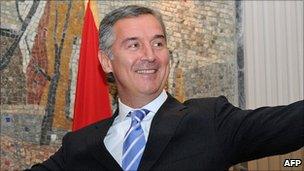
Prime Minister Milo Djukanovic says Montenegro is fighting corruption
Mr Djukanovic is the only leader from former Yugoslavia who is still in power, and his critics accuse him of having a history in organised crime himself.
"Crime is connected to all levels and [has been] involved in all elections up to now," says opposition leader Goran Danilovic.
"And for that reason we are still in opposition. If Europe does not do anything to solve this problem I am afraid that Montenegro will recruit criminals, who will use our country as a base."
Black market
The Montenegrin story reflects a conundrum that has faced Western democracies since the collapse of communism 20 years ago. As regimes foundered, their corrupt and unaccountable institutions turned to crime to survive.
Criminal gangs used government structures to traffic women, narcotics and cigarettes, making billions of dollars. It was this that caused the halt to rapid EU expansion in 2007, after Romania and Bulgaria had joined while still riddled with crime.
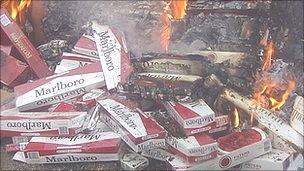
Montenegro no longer trafficks black market cigarettes, according to its prime minister
"The rules for membership are now being applied more strictly, with greater attention to detail," says Charles Grant, from the Centre for European Reform.
"But there is a risk of a vicious cycle whereby without the beacon of EU membership modernisers start losing out to conservatives."
This is the concern for Montenegro, where there is significant opposition to EU - and particularly to Nato - membership. Organised crime levels are also alleged to be high.
It all began in the 1990s, as Yugoslavia disintegrated. Montenegro found itself under Western sanctions and facing bankruptcy. The government made money by renting out its ports and airports as transit hubs for black market cigarettes.
Mr Djukanovic admits all this. But unlike many Western law enforcement agencies he does not regard it as organised crime.
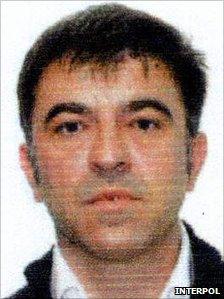
Stanko Subotic, wanted by Interpol, runs a hotel business in Montenegro
"Yes, we did use the proceeds from these cigarettes to replace the traditional revenues that we couldn't get at the time," he says.
"It was done in accordance with the laws of Montenegro. But we could not rule out that once they left here, the cigarettes may have ended up somewhere in the black markets of Italy or another European state."
Soon he found himself facing charges in Italy and was named in an organised crime civil suit brought by 10 EU governments in the United States.
But the charges were shelved, after a judge ruled that as prime minister, he had immunity from prosecution.
Montenegro officially gained its independence in 2006, bringing it closer to Western democracies who see Mr Djukanovic as a key strategic ally.
"The government is fully motivated and we have a clear road map," explains Leopold Maurer, head of the EU delegation to Montenegro, before adding: "High-level corruption has to be the priority. They have to show us that they understand."
Crime hub
But critics say they do not. "Here you can see our prime minister's name," says journalist Milka Tadic, leafing through a 2005 court document from Italy.
"If you have a prime minister indicted for such a big crime, how can you really have a modern country? Those indictments are not from yesterday. Some are 10 years old and we still have the same men in power and the government never changes."
Ms Tadic and other activists are convinced that Western policy to work with the government rather than against it will fail, creating an organised crime hub in Montenegro.
Among the names regularly cited by commentators in Montenegro is multi-millionaire businessman and hotelier Stanko Subotic, who is wanted by Interpol.
Then there is Thaksin Shinawatra, the former prime minister of Thailand, who was recently issued with a Montenegrin passport despite having a Thai arrest warrant against him.
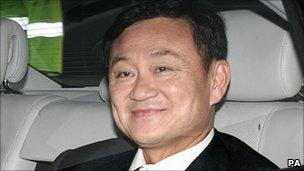
Thaksin Shinawatra, wanted in Thailand, has been granted Montenegrin citizenship
"And last year, a key suspect in a $250m (£161m) seizure of Colombian cocaine was traced to Montenegro".
But the United States is convinced it is better to work with the government rather than against it.
"No, of course it's not a perfect democracy," says the US ambassador to Montenegro, Roderick Moore.
"It has a lot of work to do. Our greatest priority in the region at large is to bring about stability and I have every reason to believe that the Montenegrins understand what our expectations are."
Mr Djukanovic says he does understand. He denies any involvement in high-level crime and says the black market cigarette trade was long in the past.
"This whole infrastructure has been dismantled," he says. "Of course, it's difficult to speak about where some individuals ended up, and about individual cases."
Correction, 14 September 2010: This story was clarified in three ways: 1) Changing "substantial" opposition to EU/Nato membership to "significant"; 2) Making clear charges against Mr Djukanovic were shelved because of immunity; 3) Making clear that a key suspect accused of cocaine smuggling - and not the whole gang - as traced to Montenegro
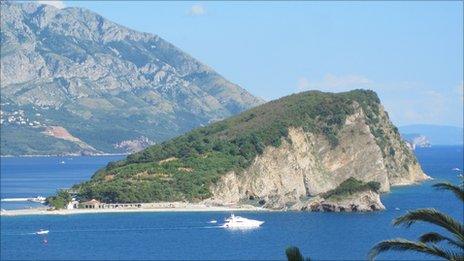
Thaksin is reportedly interested in buying the Montenegrin island of Sveti Nikola